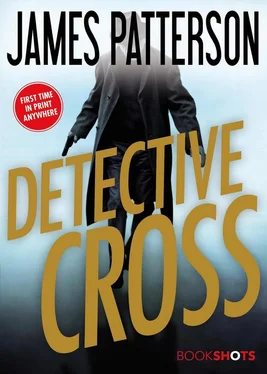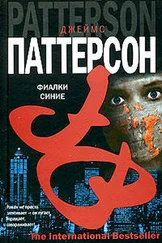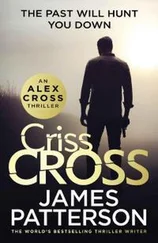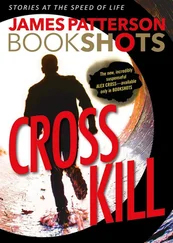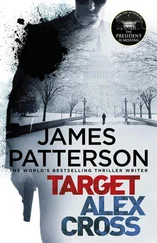“Any luck with the surveillance tapes from Union Station?”
“I have four agents watching footage from the twenty-four hours preceding the explosion, working backward from the actual blast. So far, nothing.”
“Quantico?”
“Initial reports on the first two bombs came back,” Mahoney said. “The detonators are simple, the kind you might see on an IED in the Middle East. But the explosive wasn’t taggant-free C-4. That’s why the dogs were able to locate them.”
“So what was the explosive?”
“Black powder, like for muzzle loaders, but tricked out, made more powerful. A company out in Montana makes the stuff.”
“So we can trace it?” Bree said.
“Not as easy as you think,” Mahoney said. “There are no real restrictions on the stuff. You can order it from dozens of websites online, or buy it off the shelf at hunting and fishing stores. Surprising, but the company says they make and sell thousands of pounds of the stuff per year.”
I thought out loud. “So he has knowledge of and access to a wide array of explosives. What kind of person would get that kind of knowledge and access? I mean to seek out and get the C-4?”
Mahoney said, “Money talks. You can buy nearly anything these days on the dark side of the internet.”
“Or he’s someone with real training, a military sapper. Or ex.”
“You mean like a Marine master gunnery sergeant?”
“Tim Chorey’s in detox,” I said. I started to see blue lights ahead of us, and cruisers blocking access to the Washington Monument.
“No, he’s not,” Mahoney said. “I had someone check. Chorey walked out four days ago, within hours of you dropping him.”
Dawn came. The rain had been torrential and relentless all night, hampering the search for the latest bomb, and the dark, low-hanging clouds above the Washington Monument showed no sign of clearing.
Bree and I were in our car, taking a break from the rain, listening to WTOP all-news radio and drinking coffee. I was only half paying attention to the newscast, covering the latest bomb threat and the likely effect on commuter traffic.
I was still brooding over Tim Chorey. On the drive over to detox, he’d told me he was ready for change. He was tired of the streets, tired of living in a soundless world, and tired of being blasted all the time. Blasted. It was the exact word he’d used.
Had the deaf veteran been playing me the entire time? I like to think of myself as a pretty shrewd judge of character, and an excellent reader of body language. I’d honestly believed Chorey, and I’d gone to bat for him.
The back door opened. Mahoney slid inside wearing an FBI rain slicker and ball cap. He pushed back the hood and said, “It’s a monsoon out there.”
“Anything?” I said.
“We’re positive the inner monument is clear. But this rain’s killing us. Really messes with the dogs’ noses.”
“And he could have used the pre-198 °C-4 again.”
“True. Could also be he’s abandoned his penchant for garbage cans as bomb sites. We’ve checked every one in a mile radius.”
Bree said, “Are you hearing this?”
We looked at her. She turned up the radio, reporting on a veterans’ appropriations bill stalled in the Senate. If the bill doesn’t make it to the President’s desk before Friday, there would be slashing of funds for dozens of critical veterans’ programs across the board.
“You think this has something to do with it?” Mahoney said.
“He talked about Congress not treating vets right,” she said. “Maybe this is his motivation. He knows this bill has to pass in four days, so he’s pushing.”
“But he never mentioned that specifically?” Mahoney said.
“No,” Bree said. “He didn’t.”
“It’s been seven hours since the call,” I said. “Maybe there’s no bomb this time. Maybe he’s yanking our chain.”
“What makes you think that?” Bree asked.
“It’s a freebie. He gets us mobilized, on edge, and the media worked into another frenzy, and he doesn’t have to use an ounce of plastic explosives to do it.”
“Well, he’s got me on edge,” Mahoney said. “Six cups of coffee and two hours of sleep in the last twenty-four is not the way to better mental health.”
“No, and neither is thinking Chorey’s our guy,” I said, looking over the backseat.
Mahoney started to stiffen, but I held up my palm. “The bomber hears just fine. Unless Chorey’s had a cochlear implant, he’s not who’s been calling Bree. I read his medical files. There’s no way he—”
Ned held up both hands. “Agreed, Alex. He’s not the caller. But he could be the caller’s partner.”
I couldn’t dispute that possibility. “Are you naming him a person of interest?”
“I’m supposed to have that conversation with the deputy director in about ten minutes,” Mahoney said.
“You recommending it?” Bree asked.
“I’d be remiss if I didn’t.”
I stifled a yawn, and checked my watch.
“Patients?” Bree asked.
“Just one. Eight o’clock.”
“You could cancel.”
“I’ll power through and get some sleep afterward.”
Before she could reply, her cell phone rang.
“Here we go,” she said, snatching it up, and answering it on speaker.
“I made a mistake,” the soft, strange voice said. “Silly Avenger, I put that bomb in the Air and Space Museum.”
At two minutes to eight, the bell at our basement door rang, and I snapped awake from dozing in my office. After leaving Bree and Ned on the Mall in front of the National Air and Space Museum, I’d come straight home and shut my eyes.
“Coming!” I called, then went in the bathroom to splash cold water in my face.
I opened the door. The rain had let up and Kate Williams was beaming at me.
“Were you at the scenes this morning?” she asked, sounding breathless and excited.
“All night,” I said, following her toward my office.
“Oh? Well, I’m glad you didn’t cancel, Dr. Cross. I think I found something, something about the bomber.”
I closed my office door, feeling a headache coming on. “You know Kate, the FBI, Metro, Park Police, and Capitol Hill Police are working this pretty hard.”
Her expression turned stony. “And you don’t think I could come up with something the professionals couldn’t?”
“I didn’t say that.”
“You implied it.”
I rubbed at my temples, and took a seat. “If I did, I apologize. I haven’t had much sleep. I’ve just found over the years that when amateurs get involved with cases as big as this one, they can find themselves working at odds with the authorities, and some get charged with obstruction.”
Kate crossed her arms. “I am not an amateur. I hunted bombs and bombers on a daily basis for more than three years, Dr. Cross. I’ve been in on explosive charges as many times as or more than anyone on your bomb squads.”
“I get it. But with bombs and bombers, there are protocols determined by people with bigger brains than mine, who—”
I was surprised when she suddenly burst into tears. “You don’t get it, do you? I have to do this, Dr. Cross. I have to help. You asked me about that day I got hit? I missed something. I turned the wrong way and missed something, and four IEDs went off at once. When I woke up, three of my people were dead. Brickhouse was dead, too. I lived, and good friends and the sweetest dog I’ve ever known died, Dr. Cross. So do you want to hear what I have to say, or not?”
“I’m sorry,” I said, holding out my hands. “Of course. What have you got?”
Kate dug in her raincoat pocket and came up with a tourist map of Washington, DC, which she unfolded and laid on the rug between us. Kneeling, she showed me where she’d marked and highlighted the bomb sites.
Читать дальше
